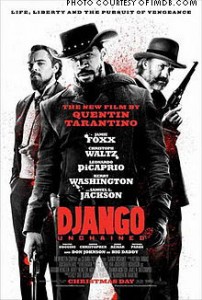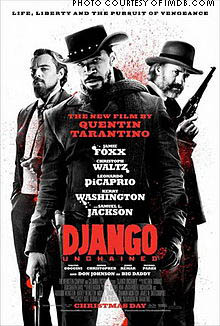
If Inglorious Basterds was a radical change to Tarantino’s directing style, then Django Unchained is a movie genre of its own. The movie incorporates so many historical themes while still sticking to its spaghetti western flavor, with the main ingredient, crude violence occurring throughout the two and a half hour duration of the movie.
Given the setting and the timeframe, the main themes are clear to most audiences. The movie does well transitioning from western to antebellum themes while still allowing both to coexist, take the opening in Texas for example . there was plenty of hype.
There was plenty of controversy to spur around leading to the premiere of the movie.
Film director, Spike Lee, who boycotted the movie, had harsh words in his interview with Vibe magazine the latest Tarantino film. “I can’t speak on it ’cause I’m not gonna see it. All I’m going to say is that it’s disrespectful to my ancestors. That’s just me. … I’m not speaking on behalf of anybody else.”
From one standpoint, people can agree to the fact that the movie at times overstepped the boundaries overusing slavery and the derogatory language, softening the severity of the practice. However what spike lee needs to realize is that it is just a movie not meant to seriously lecture an audience for two and a half hours.
Sometimes emotion can consume the mindset of people and Spike lee was at least passionate. His statement however is still in a way hypocritical. Movies like his 1989 hit Do the Right Thing was known for vulgarity, ethnic stereotypes, and yes… the repetitive use of the N-Word.
Donnell Rawlings, David Chappelle star, probably said it best on his interview with TMZ, “Spike Lee needs to relax … the n-word-filled ‘Django Unchained’ is a fun movie with a happy ending … and that’s it.”
Django Unchained admittedly is controversial in many ways, scenes showing lashing of slaves, white knights, killing of slaves, and hanging are all in the movie. However those practices were clearly denounced throughout the film’s entirety.
Django Unchained clearly denounced the practice of slavery through its entire length of the movie
Dr. King Schultz (Waltz), an enlightened German ex-dentist, is on a mission to capture slave traders for a premium bounty price. He buys the freedom of a slave, and has him help execute his mission to find them. Meanwhile Django (Foxx) seeks to find his wife (Washington), who is situated at a Mississippi plantation owned by the ruthless Calvin Candie and supervised by his aging overseer, Stephen (Morgan Freeman.)
Tarantino did great explaining to the audience that the historical practice of slavery was bad. He had several disturbing scenes in the movie to prove his point including the bondage of slaves at the opening, the Mandingo slave “cock fights”, and branding of disloyal slaves by overseers.
Probably the most ludicrous moment in the movie was the scene with the white knights complaining over the size of the eye holes on their hoods.
From all the scenes of the movie it is clear that Tarantino does not intend to be serious, and really he did not have to be.
The popular saying “don’t judge a book by its cover” is clearly presented throughout the movie. Most of Schultz’ suspects appear clean, never questioned about their background. They were indeed successful bible carrying individuals when in reality they had committed crimes against humanity.
The scene with the mandingo fight between two “heavyweight” slaves was the most startling scene in the movie. However there’s a little historical accuracy seen with every film showing mandingo fights. There are records of these slave “cock fights,” however none of them were recorded to have any fatalities. Those mandingo fights display the interracial conflict among blacks which somewhat remains present today.
Take the corporate sphere for example; there have been stories where some employees representing a minority within the business “sell their souls” to move up the corporate ladder without considering the harm done to those who are vulnerable.
Today, being the sensitive society we are, there are few films which touch the controversial historical topic of slavery, bigotry and racism. Many people when watching these films often are disturbed just by the content and never take time to dig deep into the underlying message the films is trying to bring out into the audience.
The film finishes remarkably with Django coming out the ashes and saving the day. The whole audience cheering and overall the comedic lines were met with great enjoyment.
All in all, the film met expectations, balancing the dark overtone of slavery with intervals of mind- blowing action.

Leave a Reply